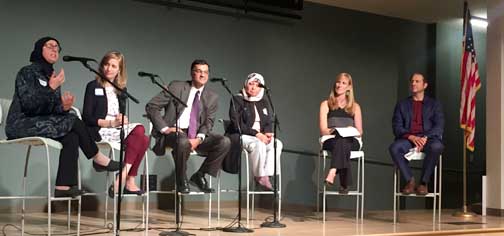
Members of the Christian and Islamic communities came together for potluck and discussion of 9/11 at La Cañada Presbyterian Church.
By Nicole MOORE
On Sept. 9, La Cañada Presbyterian Church and the Islamic Congregation of La Cañada Flintridge hosted a 9/11 remembrance event at the church titled Neighbors Working Together for Peace and Understanding.
The goal of the event was to bring Islamic and Christian community members together on a local level to discuss the tragedy of 9/11 and to remember those who lost their lives. The discussion was held to clear up misunderstandings regarding the Islamic faith as well as to take the context of the 9/11 tragedy and build lasting relationships within the interfaith community in the La Cañada area.
The event began with a reading from both the New Testament and the Quran, followed by a moment of remembrance for those who died on 9/11.
The first two speakers were Hedab Tarifi, board chair of the Islamic Center of Southern California, and Salam Al-Marayati, president of the Muslim Public Affairs Council. Both Tarifi and Al-Marayati recounted where they were on Sept. 11, 2001.
Tarifi said she was driving to work when she received a call from her friend telling her the news. Her friend expressed concern for Tarifi, as she feared people would want a scapegoat for the attacks, specifically one who practiced the Islamic faith. Tarifi remembered her coworkers huddled together, unable to work, watching the second tower going down on the television in her company’s conference room.
“It was a horrible day. As an immigrant, I felt safe in America because I survived wars and I had left that part of the world,” Tarifi recalled. “I thought it was following me. It shook me to the core.”
Al-Marayati, as a member of the National Muslim Organization, was scheduled to have a meeting with President George W. Bush to discuss ways in which American Muslims could be more involved with policies combating terrorism overseas. After the attacks, the meeting was cancelled and flights were grounded. Unable to get home, members of the National Muslim Organization reached out to local Muslims for blood donations and to help with street cleaning.
Tarifi said there was backlash towards members of the Islamic faith after the terrorist attacks, as some people reacted violently towards Muslims. She provided an example, though, to show the goodwill of the American people. Closely following the attacks, during Friday prayer, members of the interfaith community created a human shield surrounding mosques, protecting their Muslim neighbors.
“These circumstances will bring out the worst of people and the best of people,” Tarifi said. “[While] people were scared and afraid, there were a lot of people who believed in this country and believed in the [positive] role Muslims played.”
On the first anniversary of 9/11, members of the Muslim community in Southern California, including Tarifi, decided to honor the victims of the attacks by making a quilt embroidered with the names of the deceased. A total of 3,024 names, in nine rows and 11 columns, are on the quilt, which now resides in the 9/11 Memorial Museum.
Al-Marayati added that the misconception that Muslims condone terrorist attacks is hurtful and frustrating.
“Our patriotism was tested. It is un-American to test each other’s patriotism. They attacked all of us. Terrorism does not differentiate its victims. Terrorism has no faith. [ISIS and Al-Qaeda] are cults of death. Muslims represent the theology of life,” Al-Marayati said.
Next to speak were Michal Muelenburg and Maria Khani, co-founders of Two Faiths, One Friendship, an organization that connects members of the Islamic and Christian faiths in the Los Angeles area. Within the past two years, 700 Christians and Muslims have formed personal relationships by celebrating holidays together and going to study groups, discussing the respective holy texts of each other’s faiths.
“[Muslims and Christians] love God, believe in Jesus, and love food,” Khani said. “This is a place to strengthen our faiths. Conversations need to happen in the context of friendship. [Once] you care [about each other] you can have deep theological conversation.”
“There are 1,400 years of layers of misunderstanding [between Christians and Muslims],” Muelenburg added. “We want to [encourage] a peace movement happening.”
The event ended with members of both denominations having a potluck and talking together.
